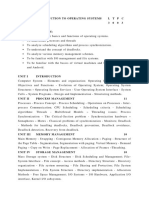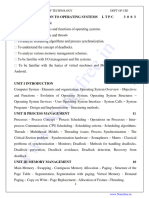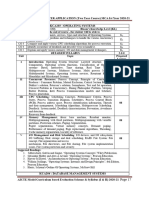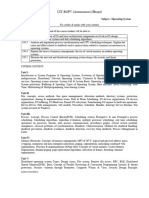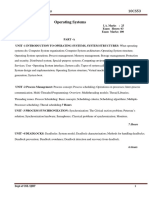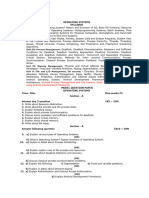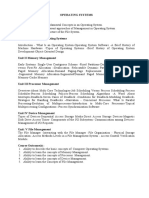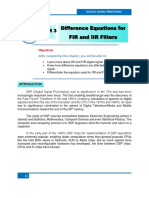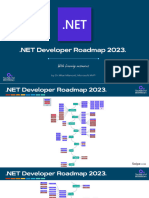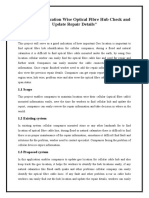CS3451 OS Syllabus
Uploaded by
ohmmuruganCS3451 OS Syllabus
Uploaded by
ohmmuruganCS3451 INTRODUCTION TO OPERATING SYSTEMS LTPC
3003
COURSE OBJECTIVES:
• To understand the basics and functions of operating systems.
• To understand processes and threads
• To analyze scheduling algorithms and process synchronization.
• To understand the concept of deadlocks.
• To analyze various memory management schemes.
• To be familiar with I/O management and file systems.
• To be familiar with the basics of virtual machines and Mobile OS like iOS and Android.We're e
xcited to announce the launch of our new website! to explore its features and benefits.
UNIT I INTRODUCTION 7
Computer System - Elements and organization; Operating System Overview -
Objectives and Functions - Evolution of Operating System; Operating System
Structures – Operating System Services - User Operating System Interface - System
Calls – System Programs - Design and Implementation - Structuring methods.
UNIT II PROCESS MANAGEMENT 11
Processes - Process Concept - Process Scheduling - Operations on Processes - Inter-
process Communication; CPU Scheduling - Scheduling criteria - Scheduling
algorithms: Threads - Multithread Models – Threading issues; Process
Synchronization - The Critical-Section problem - Synchronization hardware –
Semaphores – Mutex - Classical problems of synchronization - Monitors; Deadlock -
Methods for handling deadlocks, Deadlock prevention, Deadlock avoidance,
Deadlock detection, Recovery from deadlock.
UNIT III MEMORY MANAGEMENT 10
Main Memory - Swapping - Contiguous Memory Allocation – Paging - Structure of
the Page Table - Segmentation, Segmentation with paging; Virtual Memory - Demand
Paging – Copy on Write - Page Replacement - Allocation of Frames –Thrashing.
UNIT IV STORAGE MANAGEMENT 10
Mass Storage system – Disk Structure - Disk Scheduling and Management; File-
System Interface - File concept - Access methods - Directory Structure - Directory
organization - File system mounting - File Sharing and Protection; File System
Implementation - File System Structure - Directory implementation - Allocation
Methods - Free Space Management; I/O Systems – I/O Hardware, Application I/O
interface, Kernel I/O subsystem.
UNIT V VIRTUAL MACHINES AND MOBILE OS 7
Virtual Machines – History, Benefits and Features, Building Blocks, Types of Virtual
Machines and their Implementations, Virtualization and Operating-System
Components; Mobile OS - iOS and Android.
TOTAL: 45 PERIODS
COURSE OUTCOMES: At the end of this course, the students will be able to:
CO1 : Analyze various scheduling algorithms and process synchronization.
CO2 : Explain deadlock prevention and avoidance algorithms.
CO3 : Compare and contrast various memory management schemes.
CO4 : Explain the functionality of file systems, I/O systems, and Virtualization
CO5 : Compare iOS and Android Operating Systems.
TEXT BOOKS:
1. Abraham Silberschatz, Peter Baer Galvin and Greg Gagne, “Operating System
Concepts”‖, 10th Edition, John Wiley and Sons Inc., 2018.
2. Andrew S Tanenbaum, "Modern Operating Systems", Pearson, 5th Edition, 2022
New Delhi.
REFERENCES:
1. Ramaz Elmasri, A. Gil Carrick, David Levine, “ Operating Systems – A Spiral
Approach”, Tata McGraw Hill Edition, 2010.
2. William Stallings, "Operating Systems: Internals and Design Principles", 7th
Edition, Prentice Hall, 2018.
3. Achyut S.Godbole, Atul Kahate, “Operating Systems”, McGraw Hill Education,
2016.
You might also like
- Object Oriented Methods A Foundation PDFNo ratings yetObject Oriented Methods A Foundation PDF2 pages
- CS3451 Introduction To Operating Systems L T P CNo ratings yetCS3451 Introduction To Operating Systems L T P C4 pages
- CS3451 OPERATING SYSTEM 01 - by WWW - Learnengineering.inNo ratings yetCS3451 OPERATING SYSTEM 01 - by WWW - Learnengineering.in96 pages
- MASTER OF COMPUTER APPLICATION (Two Year Course) MCA Ist Year 2020-21 Kca203: Operating SystemsNo ratings yetMASTER OF COMPUTER APPLICATION (Two Year Course) MCA Ist Year 2020-21 Kca203: Operating Systems1 page
- Cs1011 Operating Systems L T P C Total Contact HoursNo ratings yetCs1011 Operating Systems L T P C Total Contact Hours2 pages
- V Sem Syllabus 2020-21200121020338270921011611No ratings yetV Sem Syllabus 2020-2120012102033827092101161113 pages
- Cse-V-Operating Systems (10CS53) - Notes PDFNo ratings yetCse-V-Operating Systems (10CS53) - Notes PDF150 pages
- Operating Systems: Credits: 4 Credits Course Coordinator: V.V.SubrahmanyamNo ratings yetOperating Systems: Credits: 4 Credits Course Coordinator: V.V.Subrahmanyam4 pages
- Operating Systems Theory Course Plan (Minors)No ratings yetOperating Systems Theory Course Plan (Minors)4 pages
- Anna University: Coimbatore M.C.A (Master of Computer Applications)No ratings yetAnna University: Coimbatore M.C.A (Master of Computer Applications)9 pages
- Arul Anandar Colege (Autonomous), Karumathur - 625514 Department of Computer ScienceNo ratings yetArul Anandar Colege (Autonomous), Karumathur - 625514 Department of Computer Science1 page
- Adina Institute of Science & Technology Department of Computer Science & Engineering Lecture PlanNo ratings yetAdina Institute of Science & Technology Department of Computer Science & Engineering Lecture Plan3 pages
- Operating Systems: Concepts to Save Money, Time, and FrustrationFrom EverandOperating Systems: Concepts to Save Money, Time, and FrustrationNo ratings yet
- Mastering Operating Systems: Comprehensive Guide to Overview, Administration, and SecurityFrom EverandMastering Operating Systems: Comprehensive Guide to Overview, Administration, and SecurityNo ratings yet
- AUTOSAR - The Standardized Software ArchitectureNo ratings yetAUTOSAR - The Standardized Software Architecture5 pages
- AlarmInsight - Alarm Rationalization ToolNo ratings yetAlarmInsight - Alarm Rationalization Tool2 pages
- Difference Equations For FIR and IIR Filters: ObjectivesNo ratings yetDifference Equations For FIR and IIR Filters: Objectives8 pages
- LPI - Onlinetest.201 450.v2021!04!29.by - Ava.28qNo ratings yetLPI - Onlinetest.201 450.v2021!04!29.by - Ava.28q14 pages
- Administración de Redes y Comunicaciones. Redes Escalables Cabrera Espinoza, Rodrigo. C20100% (1)Administración de Redes y Comunicaciones. Redes Escalables Cabrera Espinoza, Rodrigo. C2030 pages
- WINSEM2023-24 MSTS601L TH CH2023240503480 Reference Material I 29-02-2024 Max Product SubarrayNo ratings yetWINSEM2023-24 MSTS601L TH CH2023240503480 Reference Material I 29-02-2024 Max Product Subarray18 pages
- CTE 302 John Hunyingan Electrical HND 1 Assignment 2020No ratings yetCTE 302 John Hunyingan Electrical HND 1 Assignment 20205 pages
- Nanometrics Protocol (NP) Seismic Data Packet Format and ProcessingNo ratings yetNanometrics Protocol (NP) Seismic Data Packet Format and Processing4 pages
- UNIT 3 Developing An Enterprise ArchitectureNo ratings yetUNIT 3 Developing An Enterprise Architecture26 pages
- Zoho Interview Questions and Answers: Updated On Oct 13, 2023 14:18 ISTNo ratings yetZoho Interview Questions and Answers: Updated On Oct 13, 2023 14:18 IST19 pages
- Geographic Location Wise Optical Fibre Hub Check and Update Repair DetailsNo ratings yetGeographic Location Wise Optical Fibre Hub Check and Update Repair Details4 pages





